Building apps used to be like learning a foreign language, complex, time-consuming, and frankly, intimidating for most people. But here’s the thing: those days are officially over.
No-code app builders have completely transformed how we create apps in 2025. Whether you’re a small business owner with a brilliant idea or an entrepreneur looking to test your next big concept, these platforms put the power of an AI app maker right in your hands. No computer science degree required.
What’s even more exciting? AI-powered solutions are making this process smoother than ever. Instead of wrestling with complex interfaces, you can now describe what you want and watch your app come to life. It’s like having a tech-savvy friend who speaks fluent code and translates your vision into reality.
We’ve tested the top platforms so you don’t have to. Here are the 10 no-code app builders that deserve your attention right now.
1. Base44

Base44 takes the crown for combining artificial intelligence with no-code simplicity in ways that actually make sense. This platform doesn’t just offer drag-and-drop tools, it understands what you’re trying to build and helps you get there faster.
What makes it special: You can literally describe your app idea in plain English, and Base44’s AI will generate the foundation for you. Need a fitness tracker that connects with wearables? Just explain it, and the platform builds the core structure while you focus on the details that matter to your users.
Perfect for: Anyone who wants to move fast without getting bogged down in technical details. Entrepreneurs, small business owners, and creative minds who have great ideas but limited time to learn complex tools.
Why it stands out: While other platforms make you think like a developer, Base44 lets you think like a human. The AI handles the technical translation, so you can focus on creating something people will actually want to use.
2. Bubble
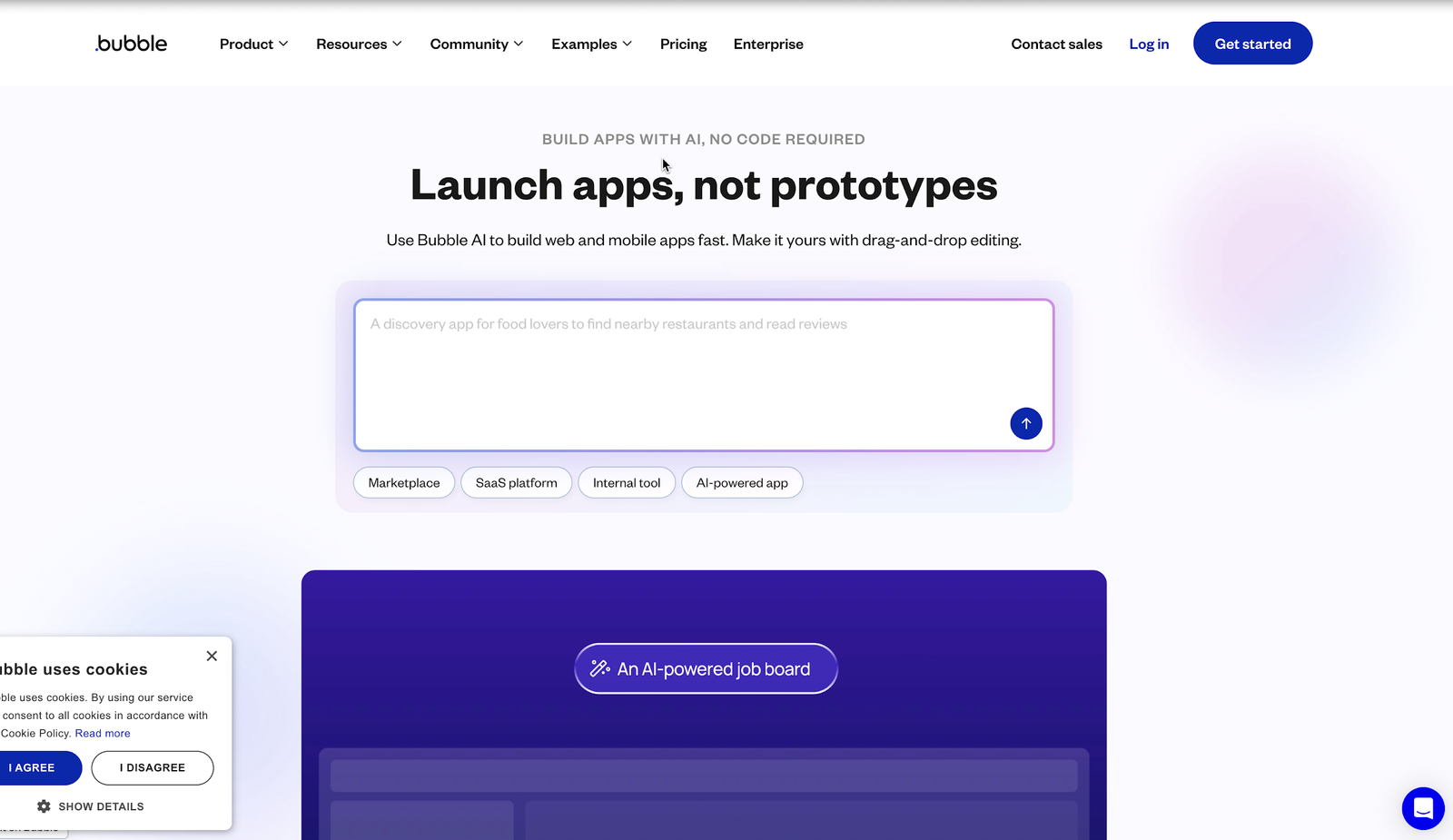
Bubble has earned its reputation as the heavyweight champion of no-code platforms. If you need an app with intricate workflows, user authentication, and database management, Bubble can handle it all.
What makes it special: This platform doesn’t limit your ambitions. Want to build the next social media platform? A complex marketplace? An internal business tool with multiple user roles? Bubble gives you the building blocks to make it happen.
Perfect for: Ambitious projects that need robust functionality. Startups planning to scale, businesses replacing legacy systems, or anyone building apps that need to handle serious traffic.
The learning curve: Here’s the honest truth – Bubble takes time to master. You’ll spend weeks understanding its logic system and database structure. But once it clicks, you can build almost anything.
3. Adalo
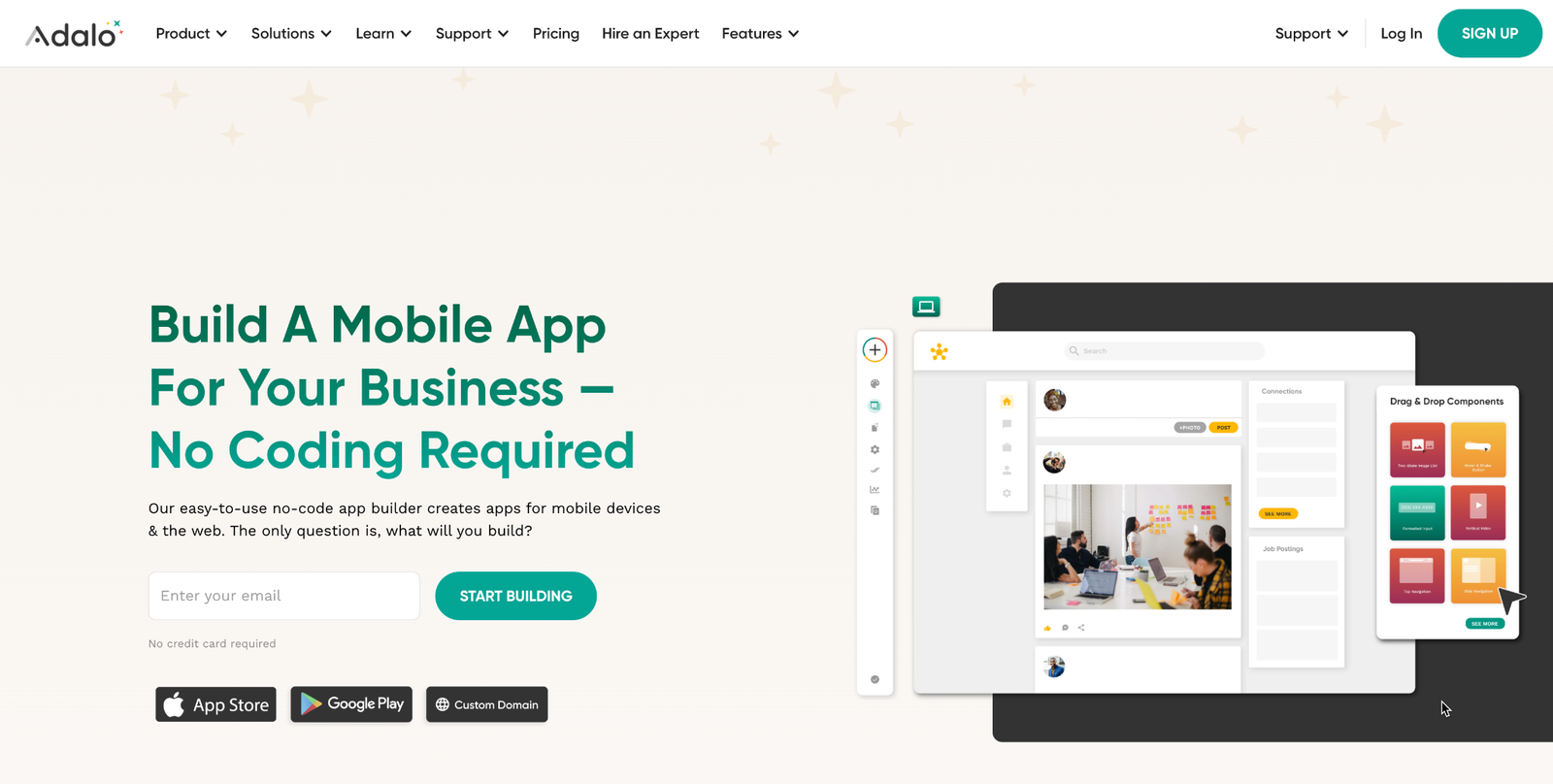
Adalo focuses specifically on mobile apps, and it shows. The platform understands that mobile users behave differently from web users, so it’s built from the ground up for touch interfaces and mobile experiences.
What makes it special: Creating native mobile apps that feel professional and polished. The component library includes everything mobile users expect – swipe gestures, push notifications, camera integration, and location services.
Perfect for: MVPs and prototypes that need to look and feel like real mobile apps. Great for testing ideas with actual users before committing to custom development.
Best use case: Restaurant ordering apps, fitness trackers, local service apps, or any business that needs a mobile presence but doesn’t have months to spend on development.
4. Replit
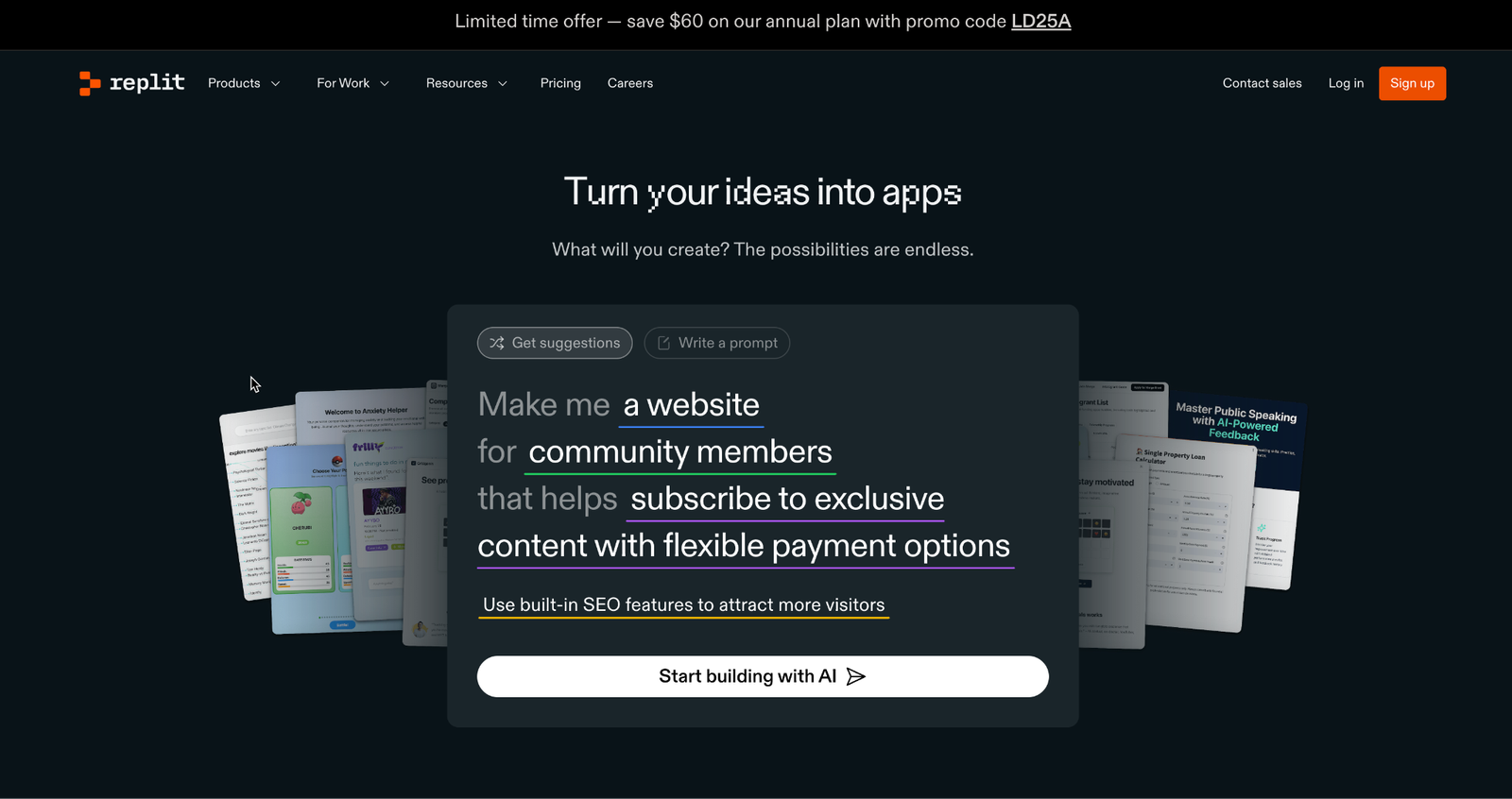
Replit occupies a unique space by combining collaborative development with AI assistance. It’s not purely no-code, but it makes coding more accessible than ever before.
What makes it special: Real-time collaboration features that let teams build together, plus AI that can write code, explain concepts, and help debug issues. You’re working with actual code, which means unlimited flexibility.
Perfect for: Teams with mixed skill levels, developers who want AI assistance, or anyone interested in learning to code while building real projects.
The sweet spot: When you need more control than traditional no-code allows but don’t want to start from scratch with traditional programming.
5. Lovable.dev
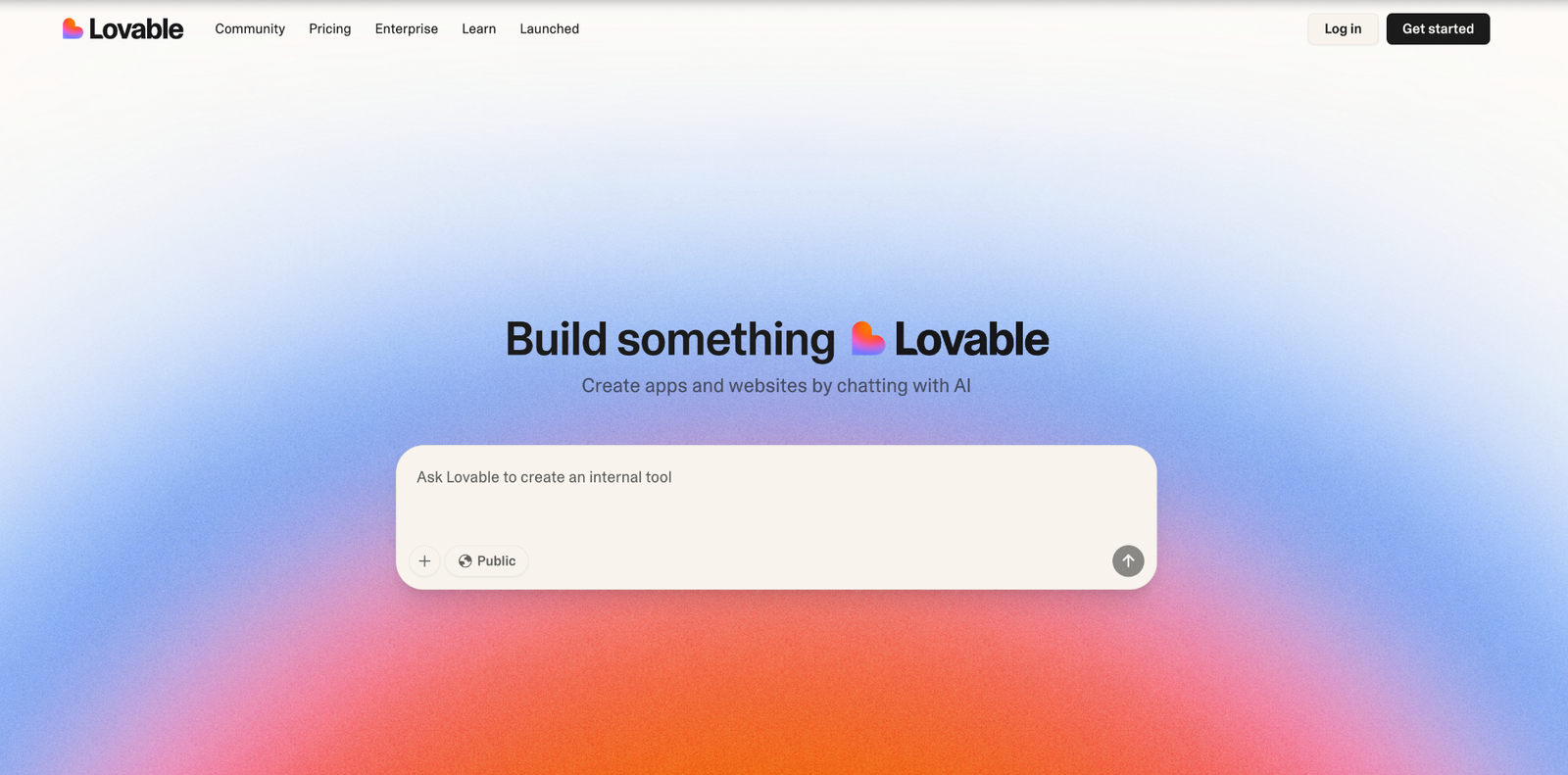
Lovable.dev positions itself as the startup founder’s best friend. The platform focuses on getting ideas from concept to testable product as quickly as possible.
What makes it special: AI-powered app generation that creates full-stack applications using modern web technologies. Your apps look professional from day one and can handle real user traffic.
Perfect for: Entrepreneurs who need to validate ideas fast, startups preparing for investor meetings, or anyone building MVPs to test market demand.
Current reality: As a newer platform, Lovable’s AI features are still developing. The potential is huge, but expect some limitations compared to more established platforms.
6. Glide
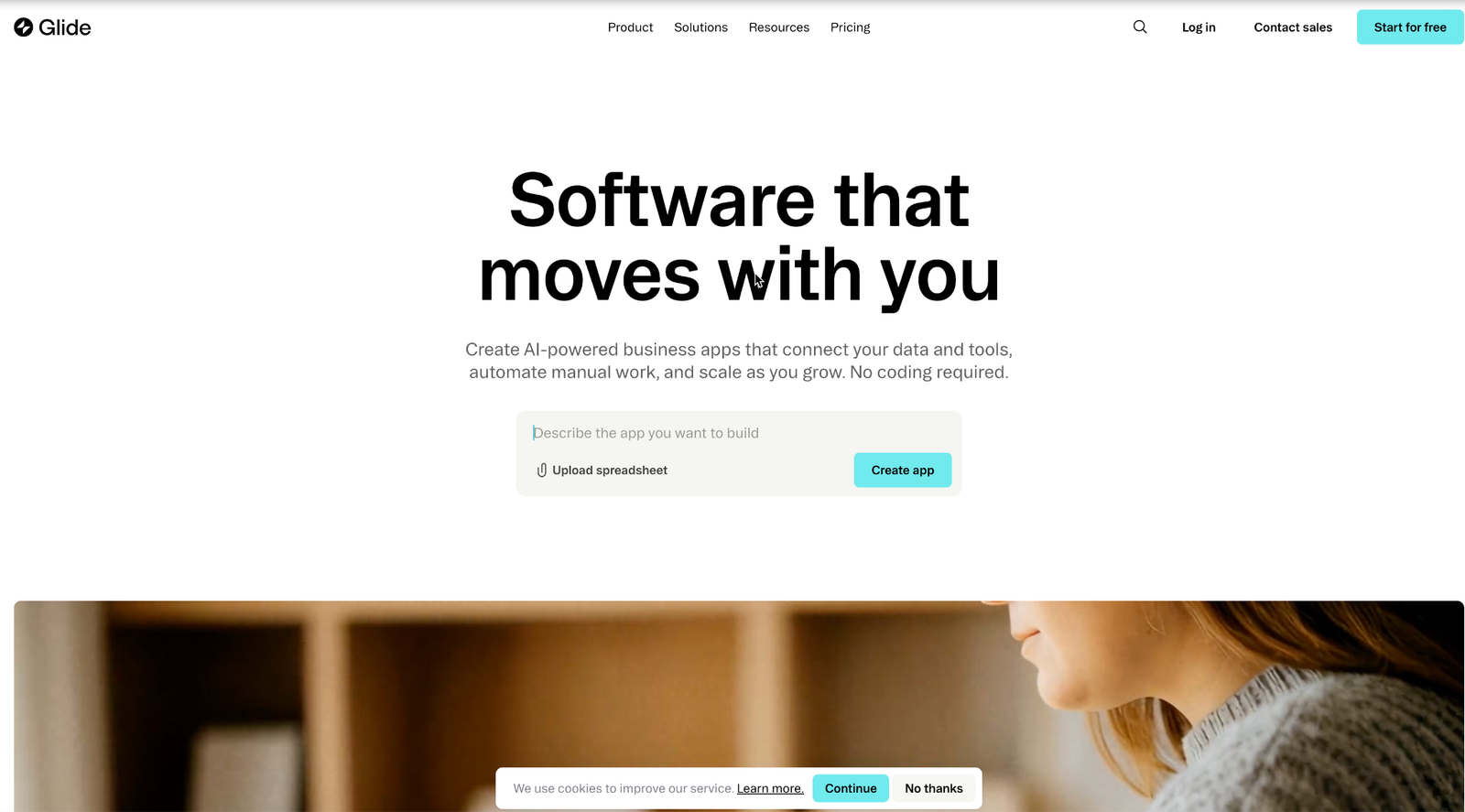
Glide solves a specific problem brilliantly: transforming data into beautiful, functional apps. If you have information in Google Sheets, Glide can turn it into a professional app in minutes.
What makes it special: Zero learning curve if you already use spreadsheets. Your data becomes interactive instantly, with filtering, search, and user management built in automatically.
Perfect for: Small businesses managing inventory, event organizers tracking attendees, teams sharing resources, or anyone with data that needs to be more accessible.
Sweet spot: When you need to make existing data more useful and interactive without starting from scratch.
7. Softr

Softr takes your Airtable or Notion databases and transforms them into polished web apps. It’s like having a professional developer who specializes in making databases user-friendly.
What makes it special: Pre-built blocks for common app features – user portals, directories, marketplaces, and internal tools. Your database structure becomes an intuitive interface automatically.
Perfect for: Businesses already using Airtable or Notion, membership sites, directories, or internal company tools that multiple teams need to access.
Why it works: Instead of learning a new database system, you use tools you already know while getting professional-looking results.
8. Appgyver (SAP)
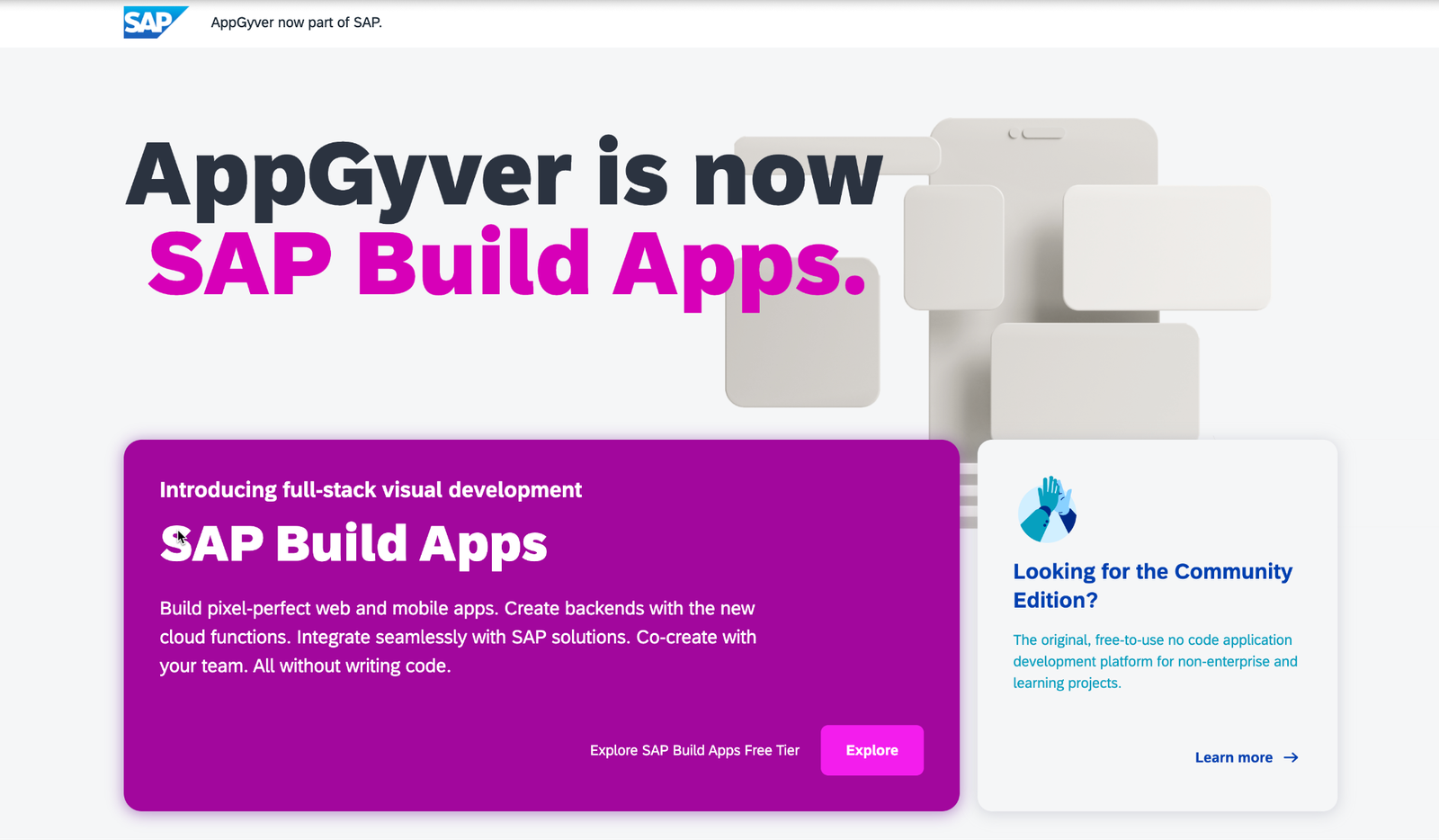
Appgyver brings enterprise-grade security and scalability to no-code development. It’s designed for organizations that need serious apps with proper governance and compliance features.
What makes it special: Enterprise integrations, advanced security features, and the ability to handle complex business processes that smaller platforms can’t manage.
Perfect for: Large companies replacing legacy systems, businesses with strict compliance requirements, or apps that need to integrate with existing enterprise software.
The trade-off: More complexity than consumer-focused platforms, but that complexity enables capabilities that simpler tools can’t match.
9. Thunkable

Thunkable focuses exclusively on creating native mobile apps that work on both iOS and Android. The platform understands mobile development challenges and solves them elegantly.
What makes it special: True native app creation with access to device features like cameras, GPS, sensors, and push notifications. Your apps feel like they belong on mobile devices.
Perfect for: Mobile-first businesses, location-based services, apps that need device integration, or anyone building specifically for mobile users.
Interface advantage: The drag-and-drop builder mimics mobile interface design, so you’re thinking mobile-first from the beginning.
10. Create.xyz

Create.xyz represents the cutting edge of no-code development. This newer platform experiments with combining traditional no-code approaches with AI assistance in creative ways.
What makes it special: Innovative features that blend AI code generation with visual building tools. You get the speed of AI with the control of traditional no-code.
Perfect for: Early adopters who want to experiment with the latest tools, developers interested in AI assistance, or anyone willing to work with evolving technology.
Current status: As a newer player, Create.xyz is still proving itself, but the innovative approach shows serious promise for the future of app building.
Making the Right Choice for Your Project
Each platform serves different needs, but here’s what’s becoming clear: the future belongs to tools that combine the best of both worlds, AI speed with human control.
Base44 nails this combination better than anyone else right now. While other platforms make you choose between AI automation or detailed control, Base44 gives you both. You get the speed of AI-powered generation with the flexibility to customize everything exactly as you envision it.
But if you’re thinking beyond the MVP — scaling to real-world traffic, handling sensitive data, or deploying across multiple systems — it’s worth considering the technical architecture behind your app too.
A recent article from Dot Magazine highlights SOA OS23, a powerful open-source service-oriented architecture framework built for exactly these scenarios. Designed to support modular development, API gateways, and event-driven workflows, SOA OS23 helps developers and organizations build scalable, secure, and cloud-native applications — perfect if you plan to extend your no-code prototype into an enterprise-grade solution.
Whether you’re building your first app or your fiftieth, the right tool makes all the difference. Start with your specific needs, consider your timeline, and remember, the best platform is the one that gets your idea in front of users fastest.
The app economy isn’t slowing down, and these tools ensure you won’t get left behind. Your next great idea deserves to see the light of day, and now you have exactly what you need to make it happen.
TL;DR
- No-code app builders are revolutionizing development in 2025, empowering non-tech users to create apps without coding skills.
- Base44 leads the pack with AI-driven features that turn app ideas into structured foundations simply by describing them in plain language.
- Bubble stands out for complex projects, though it has a steep learning curve; it’s ideal for startups needing robust functionality.
- Current market trend: AI integration is key, combining automation with user control to accelerate app creation.
● Action opportunity: These tools can help entrepreneurs validate ideas quickly, making the app economy more accessible than ever.








